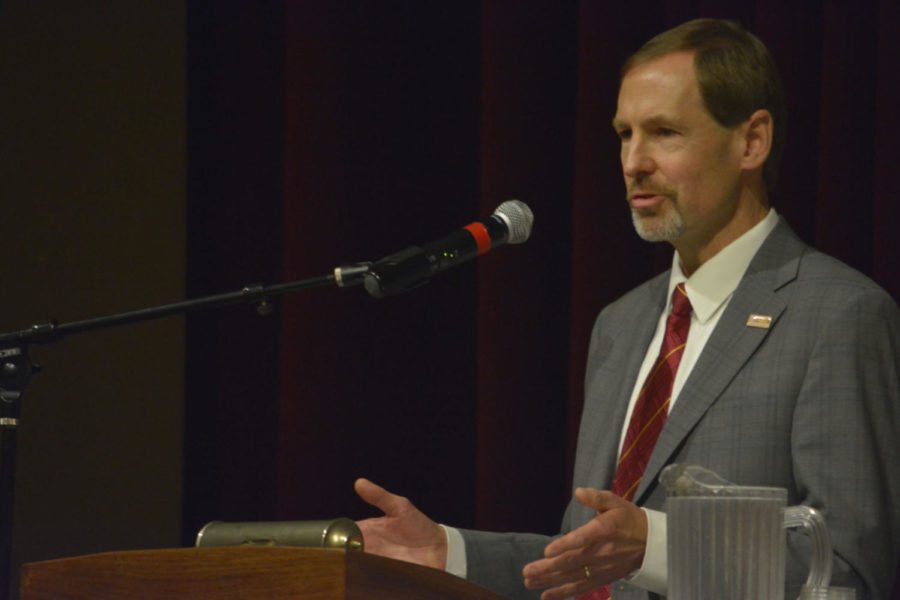Iowa State supplies medical equipment for COVID-19 response efforts
April 5, 2020
Iowa State is answering the call to help assemble supplies for the ongoing COVID-19 pandemic, even promising the ventilator from the Hixson-Lied Small Animal Hospital.
On March 30, Senior Vice President Jonathan Wickert called Iowa State personnel to take inventory of any protective equipment that is in short supply due to coronavirus. Equipment being taken into inventory included gloves, gowns, respirators and masks.
William Diesslin, associate director of environmental health and safety, said in an Iowa State News Service article that the responses poured in immediately.
Labs across campus host personal protective equipment, and some lab managers have already made use of the supplies to help those responding to COVID-19.
Diesslin said less than two days after the call was issued, Iowa State had already entered close to 130 supply-line items in an inventory. Diesslin, working as part of the Iowa State COVID-19 workforce protection planning group, has contacted local medical facilities to tell them what is available.
Over 200 N95 respirators were pledged to the Thielen Student Health Center at Iowa State by Diesslin in order to protect medical staff as they care for patients suspected of having the COVID-19 virus.
If there is a life-saving device crisis, Iowa State’s Hixson-Lied Small Animal Hospital promised their ventilator to human hospitals.
“Ventilators are currently in limited supply during the COVID-19 pandemic, and severely affected areas are having to make unbearable decisions regarding which patients get the life-saving machine they need and which patient doesn’t,” said Rebecca Walton, assistant clinical professor of veterinary clinical sciences.
Walton said over 200 ventilators being used by the veterinary community in the country have been pledged and used on the human-health side. Though over 200 ventilators are needed, the machines are providing life-saving treatment for those in need, especially in hard-hit areas, like New York. The machines can be put to use immediately because they are human ventilators.
A ventilator is a machine that provides mechanical ventilation by moving breathable air into and out of the lungs to deliver breaths to a patient who is physically unable to breathe or breathing insufficiently.
The Hixson-Lied Small Animal Hospital’s ventilator was originally built for humans. The machine is used for cats and dogs at the animal hospital but can be used on humans if the right-sized tubes are connected from the machine to the patient, Walton said.
Other supplies that have been counted in inventory and pledged to human healthcare when the need arises includes gloves, goggles, masks, sterile gowns and non-sterile gowns.
Monitoring equipment is also utilized at the veterinary hospital and is the same equipment utilized on the human front. Monitoring equipment such as pulse oximetry, which is used to measure the oxygen level of blood, and electrocardiograms, which are used to monitor heartbeats.
These monitoring supplies and more are used on animal and human patients, and veterinary hospitals are prepared to supply this equipment to human hospitals as needed.
Other veterinary hospitals are also doing their part to help fight COVID-19 by supporting the veterinary population and providing essential veterinary care. Veterinary hospitals are doing their best to flatten the curve and protect the public, Walton said.
Walton and April Blong, assistant professor of veterinary clinical sciences, are board-certified emergency and critical-care specialists. The pair, along with the Emergency and Critical Care residents, have been studying and utilizing Society of Critical Care Medicine COVID-19 resources.
“While we don’t have experience on the human-health front, we have vast experience with mechanical ventilation and veterinary critical care,” Walton said. “We, as a team, are prepared to use our knowledge and expertise on the human health front-lines if needed.”
Though the need for veterinary professionals to help has not yet come in Iowa, other parts of the country, such as California, are calling on veterinary professionals to provide aid, Walton said.
“I think it’s important for the public to know how serious this pandemic is, and we, as a veterinary community, will continue to rise to the occasion to provide essential veterinary care and also support the human health front in every way we can,” Walton said.

















